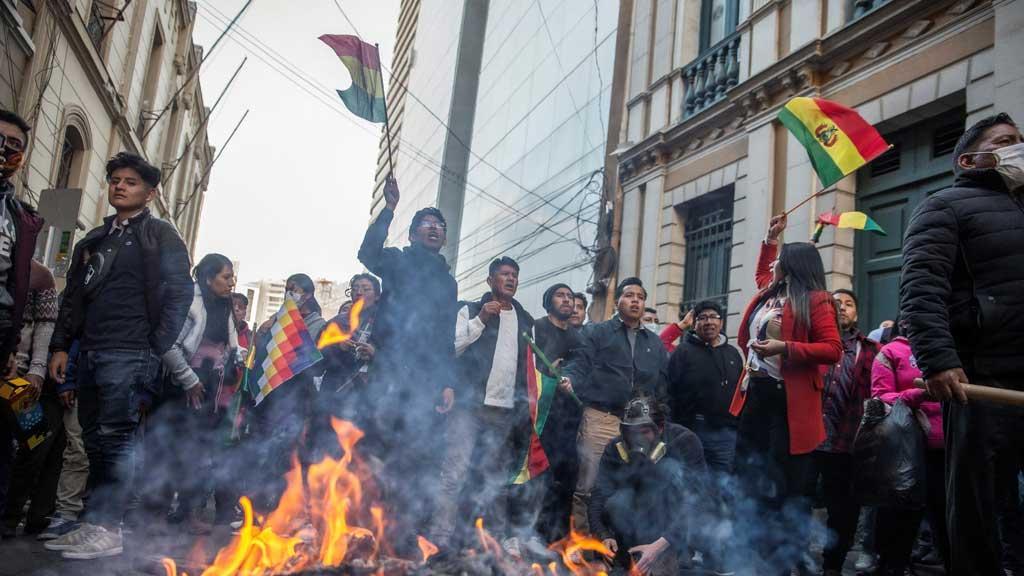
The Bolivian government of Luis Arce was on the verge of being overthrown by a military coup led by the Chief of the General Staff of the Armed Forces, General Juan José Zúñiga. The multi-tiered resistance, the support of labor organizations and the people, managed to halt the onslaught.
The live coverage provided by Telesur was of utmost importance. Alongside live images, their correspondent and studio announcers provided data and statements from international voices and organizations rejecting the coup.
On Wednesday, June 26, while President Arce was meeting with his team at the Government Palace, Plaza Murillo was invaded by hundreds of soldiers who used tear gas against the people present and broke into the Palacio Quemado before attempting to seize the Executive Branch.
Two dozen armed soldiers entered under General Zúñiga’s orders, who was energetically confronted in a discussion by President Arce and government members. A video circulating on social media details the moments of the argument in which the president consistently takes the lead and orders the seditionists to retreat.
Speaking to the press covering the incident, Zúñiga announced that he had ordered the release of all “political prisoners,” including the de facto former coup president Jeanine Añez, Luis Fernando Camacho, and others involved in the 2019 coup against Evo Morales.
Two days prior, Zúñiga stated in a televised interview that former President Evo Morales (2006-2019) could not run for president again, and if he attempted to do so, the military would arrest him. These statements were not accepted by Arce, who had already decided to remove him from his position.
After rejecting the general’s intimidation and demands, the president replaced the entire military leadership and managed to have the coup plotters evacuate Plaza Murillo. The general was arrested at night, along with other leaders, and placed at the disposal of the courts.
General Zúñiga has a questionable record as he was implicated in several actions, including his alleged involvement in the “Plan Negro,” an operation aimed at targeting political and social leaders. Additionally, he faces accusations of embezzlement of public funds.
This appears to be a new tactic of a Soft Coup, meaning that right-wing elements with direct connections to the United States would seize power with minimal casualties, leaving the president in office and forcing him to follow their orders. Arce’s intransingence prevented this, as did the vocal social movement.
The strained relationship between former President Evo Morales and Luis Arce in recent months has also fueled disunity among progressive forces and provided opportunities for the right to feel justified in taking power.
Noteworthy is the recent summoning of the Chargé d’Affaires of the U.S. Embassy, Debra Hevia, by the Bolivian Foreign Ministry for alleged interference in the country’s internal politics. The President of the Association of Relatives of Detainees, Disappeared, and Martyrs for National Liberation (ASOFAMD) denounced that the embassy “operates in Bolivia through various civil society organizations, which claim to defend human rights.”
Moreover, the frequent visits to South American countries by Commander of U.S. Southern Command, General Laura Richardson, and her interest in keeping the region under the influence of the United States should be taken into account.
During a congressional appearance, she stated that Latin America is significant to Washington because the region holds “valuable resources and rare earth elements, 60% of the lithium in the triangle (Argentina, Bolivia, Chile) necessary for current technology; the largest oil reserves are located in this region, in addition to those recently discovered in Guyana; Venezuela’s resources, including oil, gold, and copper; the lungs of the world, the Amazon; also 31% of the world’s freshwater in this region. I want to say that we have a lot to do, this region matters, it is related to our national security, and we need to intensify our efforts.”
During a January 2023 conversation with the Atlantic Council think tank, the general referred to Russia as her “number two adversary” in the region — behind China — due to the Eurasian country’s relations with Cuba, Venezuela, and Nicaragua.
Lastly, Arce’s recent visit to Moscow and intention to join the BRICS bloc have not been well received by U.S. hardliners.
Therefore, Bolivia finds itself in the “eye of the storm,” and only effective unity among the left, the social organizations, and its people can prevent the constant threats looming from the North with the help of the right-wing opposition in the country.